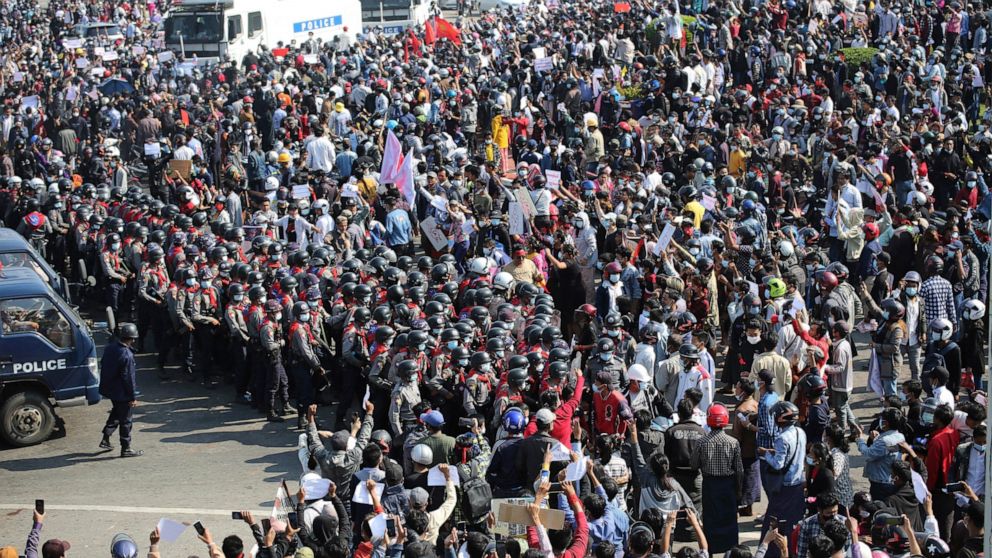Image: Protesters face riot police in Naypyitaw, Myanmar on Monday, Feb. 8, 2021. Tension in the confrontations between the authorities and demonstrators against last week’s coup in Myanmar boiled over Monday, as police fired a water cannon at peaceful protesters in the capital Naypyitaw. (AP Photo/ABC)
The Human Rights Council this afternoon adopted a resolution in which it called urgently for the immediate and unconditional release of all persons arbitrarily detained in Myanmar, including State Counsellor Aung San Suu Kyi and President Win Myint and others, and the lifting of the state of emergency.
In a resolution A/HRC/S-29/L.1 on the human rights implications of the crisis in Myanmar, adopted without a vote, the Council deplored the removal of the Government democratically elected by the people of Myanmar in the general election held on 8 November 2020, and the suspension of mandates of members of all parliaments, and called for the restoration of the democratically elected Government. The Council also called urgently for the immediate and unconditional release of all persons arbitrarily detained, including State Counsellor Aung San Suu Kyi and President Win Myint and others, and the lifting of the state of emergency, and stressed the need to refrain from violence and fully respect human rights, fundamental freedoms and the rule of law.
The Council further requested the United Nations High Commissioner for Human Rights and the Special Rapporteur on the situation of human rights in Myanmar to assess the current human rights situation in Myanmar, and to provide updates in their reports to the Human Rights Council, and called upon Myanmar authorities to engage and cooperate with United Nations human rights mechanisms.
The United Kingdom and Austria on behalf of the European Union introduced the draft resolution.
Speaking in explanation of vote were China, Russian Federation, Venezuela, Bolivia and the Philippines.
Myanmar spoke as a concerned country.
Before the Council adopted the resolution, it continued its general debate, in which speakers said that censorship had been tightened in Myanmar and security forces had cracked down violently against peaceful protesters, in violation of international standards. Noting that the military had blocked access to Facebook, Twitter, Instagram and a number of virtual private networks, speakers warned that further Internet cuts could allow the military to commit more human rights violations. Aung San Suu Kyi and other political leaders should be immediately released, as should all those who were arbitrarily detained, speakers stated.
This was the twenty-ninth special session of the Council.
Resolution on the Human Rights Implications of the Crisis in Myanmar
In a resolution A/HRC/S-29/L.1 on the human rights implications of the crisis in Myanmar, adopted without a vote as orally revised, the Council deplores the removal of the Government democratically elected by the people of Myanmar in the general election held on 8 November 2020, and the suspension of mandates of members of all parliaments, and calls for the restoration of the democratically elected Government. The Council also calls urgently for the immediate and unconditional release of all persons arbitrarily detained, including State Counsellor Aung San Suu Kyi and President Win Myint, and others, and the lifting of the state of emergency, and stresses the need to refrain from violence and fully respect human rights, fundamental freedoms and the rule of law. The Council strongly calls upon the Myanmar military and other security forces and authorities to take steps immediately to protect the rights to freedom of opinion and expression, religion or belief, association and peaceful assembly in accordance with international human rights law, and to ensure that members of civil society organizations and the media are able to operate freely and without fear of violence, harassment or intimidation. The Council also calls for the immediate lifting of restrictions on the Internet, telecommunication and social media, in accordance with international human rights law. The Council further requests the United Nations High Commissioner for Human Rights and the Special Rapporteur on the situation of human rights in Myanmar to assess the current human rights situation in Myanmar, and to provide updates in their reports to the Human Rights Council, and calls upon Myanmar authorities to engage and cooperate with UN human rights mechanisms, and further requests the Secretary-General to provide increased assistance and the resources and expertise necessary to enable them to discharge the mandate fully.
General Debate
Speakers said censorship had been tightened in Myanmar and security forces had cracked down violently against peaceful protesters, in violation of international standards. Noting that the military had blocked access to Facebook, Twitter, Instagram and a number of virtual private networks, speakers warned that further Internet cuts could allow the military to commit more human rights violations. Over 220 people have been arbitrarily detained and many more were now in hiding. Members of the Council should support all accountability mechanisms and any solutions for the peaceful resolution of the current situation. It should not be forgotten that there were reasons to believe that the military had committed crimes against humanity and possibly genocide. States should implement targeted sanctions against military leaders responsible for the coup, as well as against their business interests. The warning signs were ominous: Myanmar risked returning to the days of mass incarceration of human rights defenders. Aung San Suu Kyi and other political leaders should be immediately released, as should all those who were arbitrarily detained, speakers stated. The military must lift restrictions on humanitarian access. Some speakers urged a global arms embargo on Myanmar.
